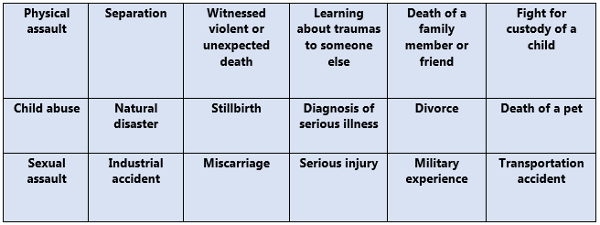What is Trauma?
Traumatic events are, unfortunately, common and affect people of all ages. In a survey of 4,558 adult residents of Caerphilly County Borough [1], 47% reported ever having experienced a major traumatic event. When asked what the worst traumatic event was, they described a wide range of different events; the commonest are shown in the table below.

All of the events shown in the table can cause marked distress and, for some, result in the development of a mental health condition. Traumatic event exposure increases vulnerability to most mental health conditions and is a requirement for a diagnosis of post-traumatic stress disorder (PTSD).
PTSD is probably the best-known mental health condition that can occur following a traumatic event, but it can only be diagnosed following events that cause actual or threatened death, serious injury, or sexual violence. It is estimated that over a third of the United Kingdom population has been exposed to a PTSD qualifying event at some point in their lives.
There is some debate over exactly what traumatic events can and cannot result in PTSD but divorce and separation are examples of events that cannot, even though they can be very traumatising for those who experience them.
Approximately one-half of the Caerphilly Borough Council residents who reported a trauma listed a PTSD qualifying event as the worst one. Death of a parent (18.6%) was the most common non-qualifying event.
[1] White J, Pearce J, Morrison S, Dunstan F, Bisson JI, Fone DL. (2015) Risk of Post Traumatic Stress Disorder following Traumatic Events in a Community Sample. Epidemiology and Psychiatric Sciences, 24, 249-257.